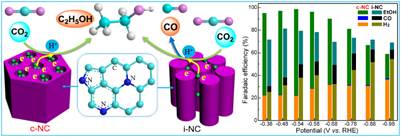
Greenhouse gas carbon dioxide (CO2) is widely considered to be responsible for the climate change, and its utilization as an alternative carbon feedstock may be a viable approach for its remedy. Consequently, electrochemical conversion of CO2 into value-added chemicals or fuels has attracted significant interest, although it suffers from a large overpotential and low selectivity.
Recently, a joint research team from CAS Key Laboratory of Low-Carbon Conversion Science & Engineering of Shanghai Advanced Research Institute (SARI) of the Chinese Academy of Sciences and SARI-ShanghaiTech University Joint Lab has found a new electrocatalyst to exclusively convert CO2 to formic acid, a chemical widely used in medical, chemical and agricultural lines all over the world over the supported Pd-Sn alloy, and thereby realizing the utilization of CO2 as an affordable carbon resource.
This is attributed to the tuning of surface electronic structures of supported Pd-Sn alloy NPs. The electrocataytic activity and selectivity are highly dependent on the surface configurations, in which formic acid with the faradaic efficiency of 99% at the lowest overpotential of -0.26 V was produced on the PdSn alloy surface with optimal surface Pd, Sn and O configuration.
On the other hand, the research team has developed a class of mesoporous nitrogen-doped carbon (N-Carbon) tailored with highly uniform cylindrical channel structures to dramatically boost C-C bond formation in CO2 electroreduction.
The as-prepared metal-free N-carbon catalyst can convert CO2 into ethanol with the faradaic efficiency as high as 77% at the low potential of −0.56 V (vs. RHE).
As the competitive CO2 reduction into carbon monoxide or other products was completely suppressed, an almost 100% selectivity to ethanol was achieved. This work will open up an avenue for developing robust metal-free carbon-based electrocatalysts for converting CO2 into C2 compounds with high selectivity and efficiency.
The latest result was published in the famous scientific journal Angewandte Chemie International Edition.

Electrocatalytic conversion of CO2 into ethanol over nitrogen-doped carbon catalysts (Image by SARI)
This work was supported by the Hundred Talents Program of the Chinese Academy of Sciences, the Ministry of Science and Technology, the SARI-ShanghaiTech Low-carbon Joint Lab, and the SARI Innovation Fund.

86-10-68597521 (day)
86-10-68597289 (night)

52 Sanlihe Rd., Xicheng District,
Beijing, China (100864)

